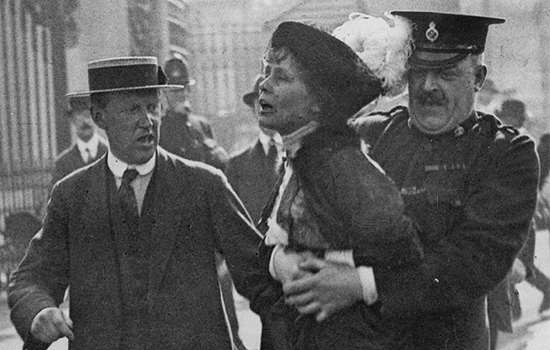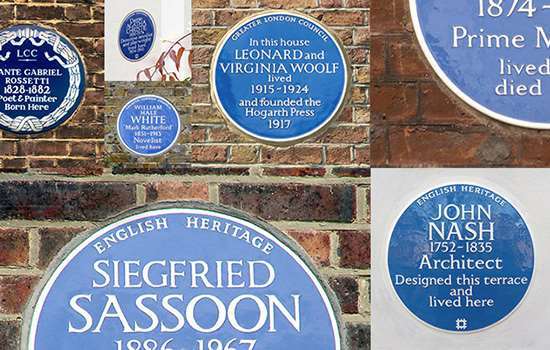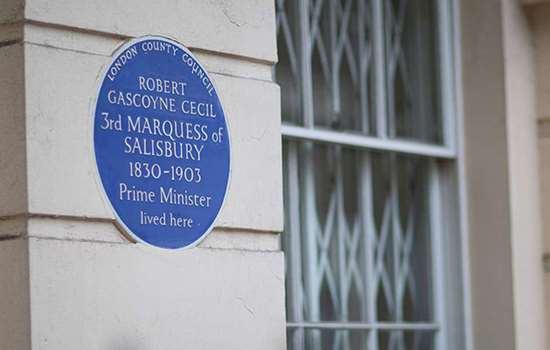MONTGOMERY, Bernard Law, Viscount Montgomery of Alamein (1887–1976) a.k.a. Monty
Plaque erected in 1987 by English Heritage at 52-54 Kennington, Kennington Oval, London, SE11 5SW, London Borough of Lambeth
All images © English Heritage
Profession
Army Officer
Category
Armed Forces
Inscription
Field Marshal VISCOUNT MONTGOMERY OF ALAMEIN 1887-1976 was born here
Material
Ceramic
Field Marshal Bernard Law Montgomery, a.k.a. ‘Monty’, was a celebrated British Army officer, best known for his leadership during the Second World War at El Alamein and in Normandy.
Early life
Bernard Montgomery was born in a large villa on Kennington Oval. The mid-19th-century house was formerly the vicarage of St Mark’s Church, Kennington, where his father, Henry, was vicar in 1879–89. The family left Kennington when Bernard was two years old, as his father was appointed Bishop of Tasmania.
The family returned to England in 1901 and five years later, Bernard went to the Royal Military College, Sandhurst. He became a junior officer in the Royal Warwickshire Regiment in 1908 and served in India until 1913.
A year after Montgomery’s return to England, the First World War began. At the first Battle of the Marne in 1914, he was shot through the right lung and was expected to die. However, he recovered and received the Distinguished Service Order for bravery. By the end of the war, he had become an exceptional staff officer and a temporary Lieutenant Colonel, with an ethos that ‘the whole art of war is to gain your objective with as little loss as possible’. This contrasted with the careless leadership he had witnessed, and was to remain his guiding principle.
Dunkirk
Monty’s abilities as a field commander came to the fore in the Second World War. In 1939, he went to France with the British Expeditionary Force to lead the 3rd Infantry Division (about 14,000 soldiers) of II Corps, under Lieutenant General Sir Allan Brooke. During the Phoney War, Montgomery meticulously retrained his men and when the German offensive finally came, breaking the centre of the Allied line, Montgomery pulled out with great skill, fighting by day and retreating by night while holding the Allied left flank. Having anticipated this early Allied reverse, Montgomery was able to get most of his division to Dunkirk and bring them home.
North Africa
In August 1942, the British 8th Army in North Africa was demoralised by successive defeats by General Irwin Rommel’s Afrika Korps. It was likely that Egypt, and all North Africa, would fall under German control. At this critical time, Montgomery was given command of the 8th Army, reporting to General Alexander. In the space of a few weeks, he had begun the transformation of a beaten army into a potent fighting force.
Monty’s positivity and plain speaking went down well with ordinary soldiers and he made frequent appearances, talking to them and telling them what he expected and what they were capable of. He was a genuine inspiration. Brooke, by this time Chief of the Imperial General Staff (head of the British Army), was impressed once more:
I knew my Monty pretty well by then, but I must confess I was dumbfounded by the situation facing him, the rapidity with which he had grasped the essentials, the clarity of his plans, and above all, his unbounded self-confidence – a self-confidence with which he inspired all those that he came into contact with.
Under Montgomery, the 8th Army blocked the German advance on Egypt in a defensive battle at Alam Halfa at the end of August. This was followed by preparations for a major offensive, which began on 27 October, and ended in the stunning victory at El Alamein. The battle was a turning point – the first major British victory against the Germans in the war, and a massive morale and propaganda boost for the Allied war effort. A determined campaign brought outright victory in North Africa within seven months, in May 1943.
Normandy
Montgomery served under General Alexander and the Allied supreme commander, General Eisenhower, during the invasions of Sicily and Italy. Monty considered it a costly and poorly coordinated diversion from the vital campaign – the invasion of Western Europe – and was pleased to return to England in December 1943 to take command of the Allied land forces for the D-Day landings in June 1944, and the battle for Normandy, under the overall leadership of Eisenhower.
D-Day planning had been going on since 1942. Unimpressed by the plan he was given, Montgomery transformed it, insisting on a larger assault landing force and creating a clear 90-day battle plan to capture Normandy as a springboard for the liberation of France and the drive to Germany. Despite personality clashes and differences of opinion between British and American commanders about progress, the result was as Montgomery had planned. Many military historians regard the landings and battle for Normandy as the greatest military achievement of the 20th century.
The Road to Victory
After Normandy, Eisenhower took over command of all Allied land forces, directing operations with several field commanders on multiple fronts, and the advance slowed. In September 1944, Montgomery’s only major failure came with his promotion of Operation Market Garden. Though it liberated about a fifth of the Netherlands, the key objective to capture a bridgehead on the Rhine at Arnhem with airborne troops failed badly, making impossible a quick advance into the German industrial heartland of the Ruhr by outflanking the heavily defended Siegfried Line.
Shortly afterwards, in December 1944, the Germans launched a massive, armoured counterattack through the Ardennes region of Belgium and Luxembourg – the Battle of the Bulge. Montgomery’s forces helped to contain the northern front of the attack to prevent a German breakthrough, though his subsequent claim of the credit offended the Americans, who had the lion’s share of the fighting.
Thereafter, Montgomery led British and Canadian armies liberating the Netherlands, Denmark and north-west Germany, and formerly accepting the surrender of German forces in these areas at Lüneburg Heath in May 1945.
Post-War Years
Montgomery served as Chief of the Imperial General Staff from 1946 – the year he was raised to the peerage as a viscount – until 1948. Afterwards, he was Eisenhower’s deputy commander of NATO forces in Europe. In the House of Lords and in print he espoused views that, when not reactionary, were idiosyncratic: he was supportive of apartheid in South Africa and of Mao’s China, and opposed British entry to the Common Market and the decriminalisation of homosexuality.
Montgomery retired from military service in 1958 to Isington Mill, near Alton, Hampshire, where he died in 1976.
Tactics, Character and Assessment
Some contemporaries and historians criticised Montgomery for cautious strategy – advancing too slowly in pursuit of a defeated enemy – including after El Alamein and in Normandy. However, this approach was deliberate: Monty was a consummate planner, determined to assemble resources and apply overwhelming force at the right time, to make victory certain and to minimise casualties.
Monty, supremely confident and not shy of publicity, cut a strong and instantly recognisable figure in his trademark Aussie slouch hat or black beret. This certainly helped to build morale among his soldiers, and he had a genuine concern, rooted in Christian faith, for their welfare. He was professional and methodical, making sure that his officers understood battle plans clearly and that the fighting men knew what was expected. He insisted on physical fitness, trained everyone thoroughly, and embraced the ‘all-arms’ approach to warfare.
On the other hand, Montgomery could be outspoken, arrogant, openly critical of peers and superiors, and totally lacking in diplomacy. To an extent this was typical of the competitive nature of high command, but Monty became a handicap in terms of British–American relations: most notably, he criticised Eisenhower (by then US president) in his memoirs (1958) for having prolonged the Second World War through instances of poor leadership . ‘In defeat, unbeatable; in victory, unbearable’ was the verdict of Winston Churchill.
For a time Montgomery’s boastfulness and lack of tact were drags on his reputation. The passage of time, however, has served to focus attention rather on his extraordinary wartime endeavours; the Oxford Dictionary of National Biography calls him ‘the outstanding British field commander of the twentieth century’.


